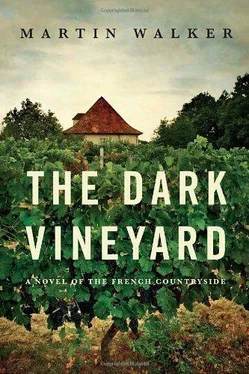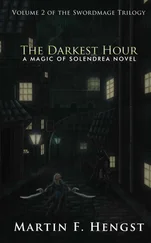Martin Walker - The dark vineyard
Здесь есть возможность читать онлайн «Martin Walker - The dark vineyard» весь текст электронной книги совершенно бесплатно (целиком полную версию без сокращений). В некоторых случаях можно слушать аудио, скачать через торрент в формате fb2 и присутствует краткое содержание. Жанр: Полицейский детектив, на английском языке. Описание произведения, (предисловие) а так же отзывы посетителей доступны на портале библиотеки ЛибКат.
- Название:The dark vineyard
- Автор:
- Жанр:
- Год:неизвестен
- ISBN:нет данных
- Рейтинг книги:5 / 5. Голосов: 1
-
Избранное:Добавить в избранное
- Отзывы:
-
Ваша оценка:
- 100
- 1
- 2
- 3
- 4
- 5
The dark vineyard: краткое содержание, описание и аннотация
Предлагаем к чтению аннотацию, описание, краткое содержание или предисловие (зависит от того, что написал сам автор книги «The dark vineyard»). Если вы не нашли необходимую информацию о книге — напишите в комментариях, мы постараемся отыскать её.
The dark vineyard — читать онлайн бесплатно полную книгу (весь текст) целиком
Ниже представлен текст книги, разбитый по страницам. Система сохранения места последней прочитанной страницы, позволяет с удобством читать онлайн бесплатно книгу «The dark vineyard», без необходимости каждый раз заново искать на чём Вы остановились. Поставьте закладку, и сможете в любой момент перейти на страницу, на которой закончили чтение.
Интервал:
Закладка:
As he went back to the main doors of the church, they opened and J-J emerged. “Saw you leave,” he said, handing Bruno a computer printout. “Here’s that reply you wanted from Quebec.” Bruno had sent him a text message the previous evening, asking him to send a routine “Anything Known?” query on Jacqueline to the Quebec police. “It looks like she’s clean,” J-J added, “which means she’s in better shape than I am. The prefect is furious with me, and we’ve got a fancy lawyer threatening to sue me personally for the wrongful arrest of Bondino.”
“Still no attestation of wrongful death from the pathologist?” Bruno asked. He resisted the temptation to remind J-J that he’d warned him of this.
“No, so they can’t appoint a juge d’instruction, and I can’t hold Bondino any longer. I’ve got his fingerprints, and I think the DNA will show it was his hair under the dead man’s fingernails. But until the pathologist’s report there’s no crime as yet, so he’s free, and I’m in the merde. I’m so deep in it that I’ve had to come down here to apologize to your Captain Duroc for misusing his gendarmerie. The prefect insisted. But I’m still not sure I’m wrong.”
“This reply from Quebec came back very fast. I wasn’t expecting an answer for a couple of days.”
“I rang our friend the brigadier, thinking he could get it faster. I got it overnight.”
The music swelled, and the doors opened. Led by Father Sentout and a boy in a white robe bearing a tall cross, Raoul and the other pallbearers emerged with the coffin. The flags all rose in salute and led the procession to the war memorial across the bridge. The mayor came out with Cresseil’s medals on the cushion and the gendarmes lined up behind him. The baron followed with Cresseil’s cousins. He caught Bruno’s eye, discreetly giving him a thumbs-up. He must have made a deal to buy their claim. The school band struck up “Le Chant des Partisans,” the Resistance anthem, and led the rest of the congregation behind the bobbing flags of France, of Saint-Denis and of the Cross of Lorraine, the wartime symbol of Free France.
Rollo, the headmaster, ensured that every resident of the retirement home in the procession was accompanied by a youngster to help him or her along. The old people scanned one another’s faces as they hobbled from the church. Bruno wondered if their glances indicated relief that this was not their time while they weighed which of their number might be next.
Bruno had placed the town’s wreath in readiness before the statue of the French soldier from the Great War with the gleaming brass eagle perched above. There was a second wreath from the Compagnons de la Resistance and a third from the Anciens Combattants. Bruno felt a sudden glow of pride that his town and his nation still took the deaths of such patriots so seriously, still honored the ancient virtues of patriotism and courage, and still insisted that the young remembered at what price their liberties had been bought. It was a fine community that could generate such mutual affection between young and old strangers as had grown between Max and Cresseil. Bruno felt a lump forming in his throat as he thought that Cresseil’s last sight on earth may have been the floating body of the young man he had come to love like a son.
The flags dipped in salute, the mayor laid his wreath, and then Bachelot, the shoemaker and veteran Gaullist, laid the wreath from the Compagnons, and his lifelong enemy, Jean-Pierre of the Communist Francs-Tireurs et Partisans, laid the wreath from the Anciens Combattants. It was the sort of compromise that made French politics work, and that was only made possible by the forbearance of Marie-Louise. A courier for the Resistance, she had been arrested by the Gestapo at the age of fourteen and sent to Buchenwald, and in Bruno’s eyes had thus suffered more for France than Jean-Pierre and Bachelot together. But Marie-Louise never made a fuss, always volunteered, and considered all the young people of Saint-Denis the grandchildren she’d never had. She stood watching impassively as the two old men straightened their backs and saluted and returned to their places. As the band struck up the “Marseillaise,” tears rolled down her cheeks.
The national anthem ended and the pallbearers loaded the coffin into the hearse for the short drive to the cemetery. Bruno gathered up the flags, and carried them all back into the basement of the mairie. Then he went upstairs to his office and took out the printout that J-J had given him. That reminded him. He picked up the phone, checking the number on the card in his drawer, and called the brigadier in Paris.
An aide answered. When Bruno gave his name he was surprised to hear: “You’re on the approved list. I’ll connect you now.” And then the brigadier was on the line.
“Our friend J-J is in trouble,” Bruno began.
“I know. The American ambassador came in to see the minister and lodged a complaint. I’m taking care of it. Don’t worry, the minister understands that it wouldn’t be wise to dissuade our police from showing a maximum of zeal. And I gather that thanks to you, this young American didn’t even spend a night in jail. There’s not a lot they can complain about. Did you get my message for you from Quebec?”
“Yes, sir. I’m looking at it now.”
“Good. And don’t forget, there’s a job for you here if you want one. And there’s a message from another friend of yours on the minister’s staff, Chief Inspector Perrault. I think you knew she was on assignment in Luxembourg? She says she’s looking forward to seeing you the weekend of the rugby match against Scotland. I got four tickets, for you and J-J, Perrault and me. Dinner on me afterward at the Tour d’Argent.”
If the brigadier said J-J would be all right, Bruno was prepared to believe him. Isabelle was another matter. He still felt a frisson of excitement at the thought of seeing her again, but he feared there was little future in it. Perhaps the invitation was the brigadier’s way of tempting him to give up Saint-Denis and move to Paris to join his team. Or perhaps Isabelle and the brigadier had planned it together, not understanding the bonds that kept him in Perigord. He could never leave Gigi locked up in some tiny Paris apartment. Besides, there was now Pamela. He had no idea where their-he hunted for a word that was more than “flirtation” and less than “affair”-liaison was heading. It was exciting, just the same. Now, however, he had work to do.
He looked again at the e-mail from Quebec. Nothing known against Jacqueline Duplessis, which meant no criminal record, and given the brigadier’s contacts probably nothing suspected against her. Bruno read on idly through the raw facts he had already scribbled into his notebook from her passport: date of birth, address, next of kin, mother’s maiden name… and then he stopped. He looked again at the printout from Quebec: mother’s maiden name, Sophia Maria Bondino; nationality, United States of America.
Suddenly everything that Bruno thought he knew about Jacqueline and Bondino shifted. He went back to his file of material on the history of the Bondino family and its feuds and began to read carefully, taking brief notes. He checked his watch. Jacqueline would be working at the cave for another three hours or more. He called Nathalie at the cave and asked her to check the files to find out when Jacqueline had first applied to work there. He went back to his files and the phone rang. He reached for it, expecting Nathalie’s call, but froze when he heard another, far more familiar voice.
“I’m calling from a phone booth at a service station on the way back from Luxembourg,” Isabelle said. “I don’t want this call showing up on my records because I shouldn’t be telling you this but it might help get J-J out of trouble.”
Читать дальшеИнтервал:
Закладка:
Похожие книги на «The dark vineyard»
Представляем Вашему вниманию похожие книги на «The dark vineyard» списком для выбора. Мы отобрали схожую по названию и смыслу литературу в надежде предоставить читателям больше вариантов отыскать новые, интересные, ещё непрочитанные произведения.
Обсуждение, отзывы о книге «The dark vineyard» и просто собственные мнения читателей. Оставьте ваши комментарии, напишите, что Вы думаете о произведении, его смысле или главных героях. Укажите что конкретно понравилось, а что нет, и почему Вы так считаете.












